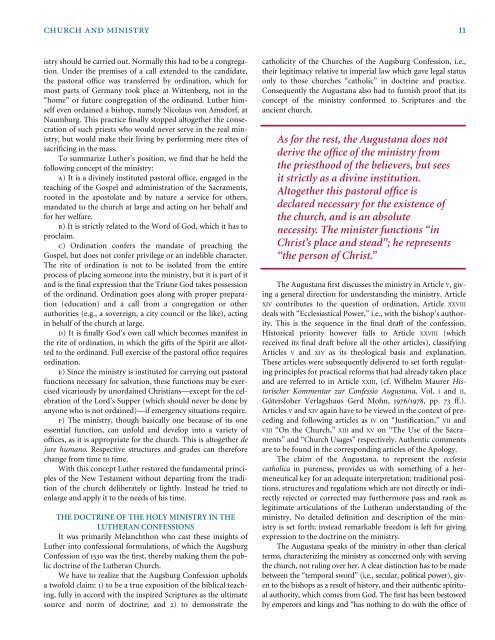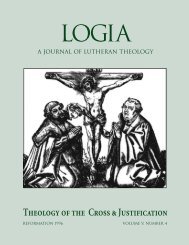Create successful ePaper yourself
Turn your PDF publications into a flip-book with our unique Google optimized e-Paper software.
church and ministry 11<br />
istry should be carried out. Normally this had to be a congregation.<br />
Under the premises of a call extended to the candidate,<br />
the pastoral office was transferred by ordination, which for<br />
most parts of Germany took place at Wittenberg, not in the<br />
“home” or future congregation of the ordinand. Luther himself<br />
even ordained a bishop, namely Nicolaus von Amsdorf, at<br />
Naumburg. This practice finally stopped altogether the consecration<br />
of such priests who would never serve in the real ministry,<br />
but would make their living by performing mere rites of<br />
sacrificing in the mass.<br />
To summarize Luther’s position, we find that he held the<br />
following concept of the ministry:<br />
a) It is a divinely instituted pastoral office, engaged in the<br />
teaching of the Gospel and administration of the Sacraments,<br />
rooted in the apostolate and by nature a service for others,<br />
mandated to the church at large and acting on her behalf and<br />
for her welfare.<br />
b) It is strictly related to the Word of God, which it has to<br />
proclaim.<br />
c) Ordination confers the mandate of preaching the<br />
Gospel, but does not confer privilege or an indelible character.<br />
<strong>The</strong> rite of ordination is not to be isolated from the entire<br />
process of placing someone into the ministry, but it is part of it<br />
and is the final expression that the Triune God takes possession<br />
of the ordinand. Ordination goes along with proper preparation<br />
(education) and a call from a congregation or other<br />
authorities (e.g., a sovereign, a city council or the like), acting<br />
in behalf of the church at large.<br />
d) It is finally God’s own call which becomes manifest in<br />
the rite of ordination, in which the gifts of the Spirit are allotted<br />
to the ordinand. Full exercise of the pastoral office requires<br />
ordination.<br />
e) Since the ministry is instituted for carrying out pastoral<br />
functions necessary for salvation, these functions may be exercised<br />
vicariously by unordained Christians—except for the celebration<br />
of the Lord’s Supper (which should never be done by<br />
anyone who is not ordained)—if emergency situations require.<br />
f) <strong>The</strong> ministry, though basically one because of its one<br />
essential function, can unfold and develop into a variety of<br />
offices, as it is appropriate for the church. This is altogether de<br />
jure humano. Respective structures and grades can therefore<br />
change from time to time.<br />
With this concept Luther restored the fundamental principles<br />
of the New Testament without departing from the tradition<br />
of the church deliberately or lightly. Instead he tried to<br />
enlarge and apply it to the needs of his time.<br />
THE DOCTRINE OF THE HOLY MINISTRY IN THE<br />
LUTHERAN CONFESSIONS<br />
It was primarily Melanchthon who cast these insights of<br />
Luther into confessional formulations, of which the Augsburg<br />
Confession of 1530 was the first, thereby making them the public<br />
doctrine of the Lutheran Church.<br />
We have to realize that the Augsburg Confession upholds<br />
a twofold claim: 1) to be a true exposition of the biblical teaching,<br />
fully in accord with the inspired Scriptures as the ultimate<br />
source and norm of doctrine; and 2) to demonstrate the<br />
catholicity of the Churches of the Augsburg Confession, i.e.,<br />
their legitimacy relative to imperial law which gave legal status<br />
only to those churches “catholic” in doctrine and practice.<br />
Consequently the Augustana also had to furnish proof that its<br />
concept of the ministry conformed to Scriptures and the<br />
ancient church.<br />
As for the rest, the Augustana does not<br />
derive the office of the ministry from<br />
the priesthood of the believers, but sees<br />
it strictly as a divine institution.<br />
Altogether this pastoral office is<br />
declared necessary for the existence of<br />
the church, and is an absolute<br />
necessity. <strong>The</strong> minister functions “in<br />
Christ’s place and stead”; he represents<br />
“the person of Christ.”<br />
<strong>The</strong> Augustana first discusses the ministry in Article V, giving<br />
a general direction for understanding the ministry. Article<br />
XIV contributes to the question of ordination, Article XXVIII<br />
deals with “Ecclesiastical Power,” i.e., with the bishop’s authority.<br />
This is the sequence in the final draft of the confession.<br />
Historical priority however falls to Article XXVIII (which<br />
received its final draft before all the other articles), classifying<br />
Articles V and XIV as its theological basis and explanation.<br />
<strong>The</strong>se articles were subsequently delivered to set forth regulating<br />
principles for practical reforms that had already taken place<br />
and are referred to in Article XXIII, (cf. Wilhelm Maurer Historischer<br />
Kommentar zur Confessio Augustana, Vol. I and II,<br />
Gütersloher Verlagshaus Gerd Mohn, 1976/1978, pp. 73 ff.).<br />
Articles V and XIV again have to be viewed in the context of preceding<br />
and following articles as IV on “Justification,” VII and<br />
VIII “On the Church,” XIII and XV on “<strong>The</strong> Use of the Sacraments”<br />
and “Church Usages” respectively. Authentic comments<br />
are to be found in the corresponding articles of the Apology.<br />
<strong>The</strong> claim of the Augustana, to represent the ecclesia<br />
catholica in pureness, provides us with something of a hermeneutical<br />
key for an adequate interpretation: traditional positions,<br />
structures and regulations which are not directly or indirectly<br />
rejected or corrected may furthermore pass and rank as<br />
legitimate articulations of the Lutheran understanding of the<br />
ministry. No detailed definition and description of the ministry<br />
is set forth; instead remarkable freedom is left for giving<br />
expression to the doctrine on the ministry.<br />
<strong>The</strong> Augustana speaks of the ministry in other than clerical<br />
terms, characterizing the ministry as concerned only with serving<br />
the church, not ruling over her. A clear distinction has to be made<br />
between the “temporal sword” (i.e., secular, political power), given<br />
to the bishops as a result of history, and their authentic spiritual<br />
authority, which comes from God. <strong>The</strong> first has been bestowed<br />
by emperors and kings and “has nothing to do with the office of

















